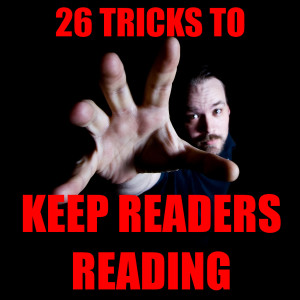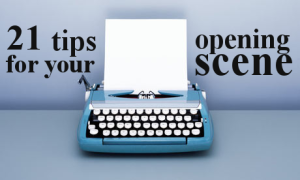Your neighborhood is about to be blown up by alien invaders. You have 24 hours to pack your car and get out of the city. What do you bring?
You have to choose the most essential, useful, meaningful items that you can possibly fit in a limited space. You have plenty of time to choose, but – still. You might seriously regret taking the gun instead of the pitchfork two months from now when you’ve run out of bullets and discover you have to grow your own food.
Sometimes the things that seem essential are really just taking up space.
That’s what it’s like to write a novel.
It’s also one last tip in how to write a page-turner.
Cut the fluff.

The second A in AIDA
Fluff drags the writing. It’s clutter. Every unnecessary word makes a sentence harder to understand. The brain must sort through what’s important and what’s not, sometimes going over a sentence three or four times to make sure it read it right. More work for your readers’ weary eyes and minds. And yet another reason to stop reading.
“But I don’t have any fluff,” you might say, “Everything I say is relevant,” you might insist.
Are you sure about that?
Here are 19 examples of pointlessly wordy expressions from Strunk & White’s Rule no. 17:
- The question as to whether (instead, say: whether)
- There is no doubt but that (no doubt/doubtless)
- Used for fuel purposes (used for fuel)
- He is a man who (he)
- In a hasty manner (hastily)
- This is a subject that (this subject)
- His story is a strange one. (His story is strange.)
- The reason why is that (because)
“the fact that” is never necessary:
- Owing to the fact that (since / because)
- In spite of the fact that (though / although)
- Call your attention to the fact that (remind you / notify you)
- I was unaware of the fact that ( I was unaware that / did not know)
- The fact that he had not succeeded (his failure)
- The fact that I had arrived (my arrival)
Case, character and nature are rarely necessary:
- In many cases, the rooms were poorly ventilated (Many of the rooms were poorly ventilated)
- It has rarely been the case that any mistake has been made (Few mistakes have been made)
- Acts of a hostile character/nature (Hostile acts)
Who is, which was, etc. are rarely necessary:
- His brother, who is a member of the same firm (His brother, a member of the same firm)
- Trafalgar, which was Nelson’s last battler (Trafalgar, Nelson’s last battle)
In On Writing Well, William Zinsser has plenty to say about clutter.
It won’t do to say that the reader is too dumb or too lazy to keep pace with the train of thought. If the reader is lost, it’s usually because the writer hasn’t been careful enough….A clear sentence is no accident. Very few sentences come out right the first time, or even the third time.
He points out “[clutter] slows the reader and makes the writer seem pretentious.”
Here are 24 examples:
- Assistance ( Help)
- Numerous (Many)
- Facilitate (Ease)
- Individual (Man or woman)
- Remainder (Rest)
- Initial (First)
- Implement (Do)
- Sufficient (Enough)
- Attempt (Try)
- Referred to as (Called)
- With the possible exception of (Except)
- He totally lacked the ability to (He couldn’t)
- Until such time as (Until)
- For the purpose of (For)
Currently, at the present time, and at this point in time can all be replaced with now or today.
Cut fluff phrases like:
- I might add
- It should be pointed out
- It is interesting to note
And phrases that indicate self-doubt (thereby and weakening the tone), like:
- A bit
- Sort of
- I’m tempted to say
- In a sense
I’ll add a few of my own:
- Very [usually superfluous: very loud, very tall]
- That [can often be cut: he thought that she was pretty vs. he thought she was pretty]
- In order to (To)
- Help to (Help)
Will Your voice may demand that you break some of these rules? Possibly. But only some. I challenge you to commit to cutting 500 words from out of your first chapter.* Take a word count, write it on a sticky note, stick it to your monitor and start cutting. You don’t have to cut whole paragraphs. You may not even have to cut whole sentences. Just a phrase here or there. Change from passive voice to active to save a word or two. Get clever. When you’ve cut reached your 500 mark, go back and reread the chapter. See just how much sharper the writing is.
—
* This is assuming Only if you’re in the final editing stages. If you’re still fixing plot problems, don’t worry about line editing yet.
NOTE: The actual edits in this post are examples, not rules. For voice, it might have been wise to leave some of the phrasing as it was. But none of the cuts confused the meaning – good to know if you’re ever up against a word limit.
–








